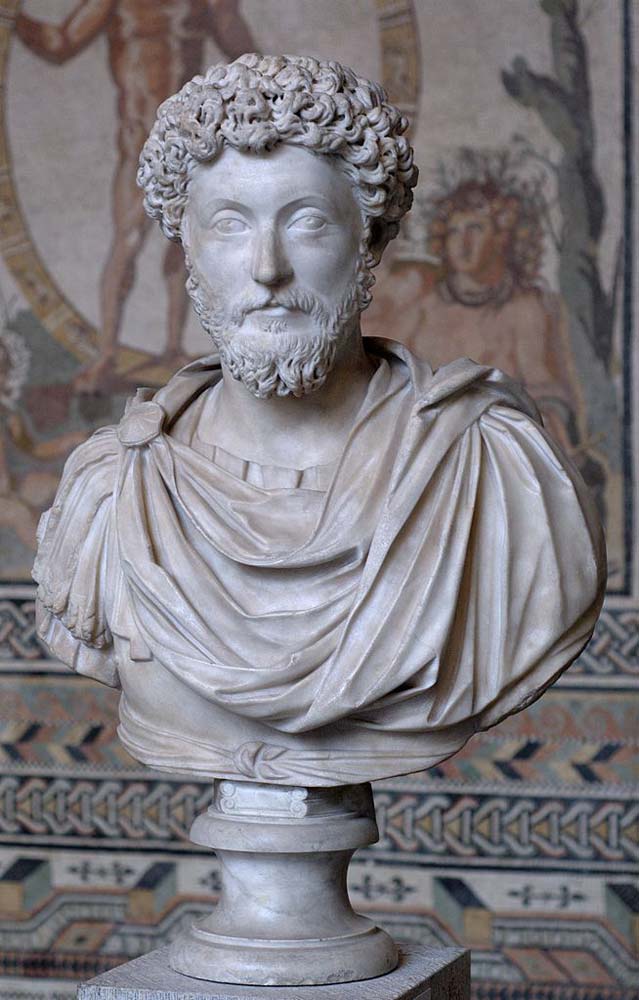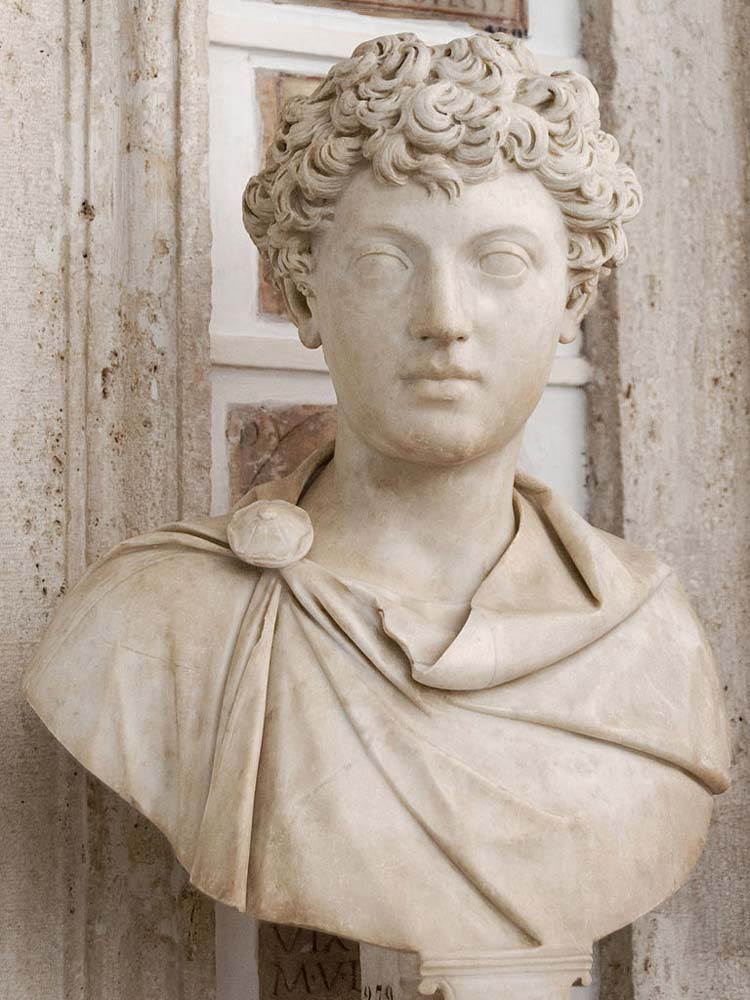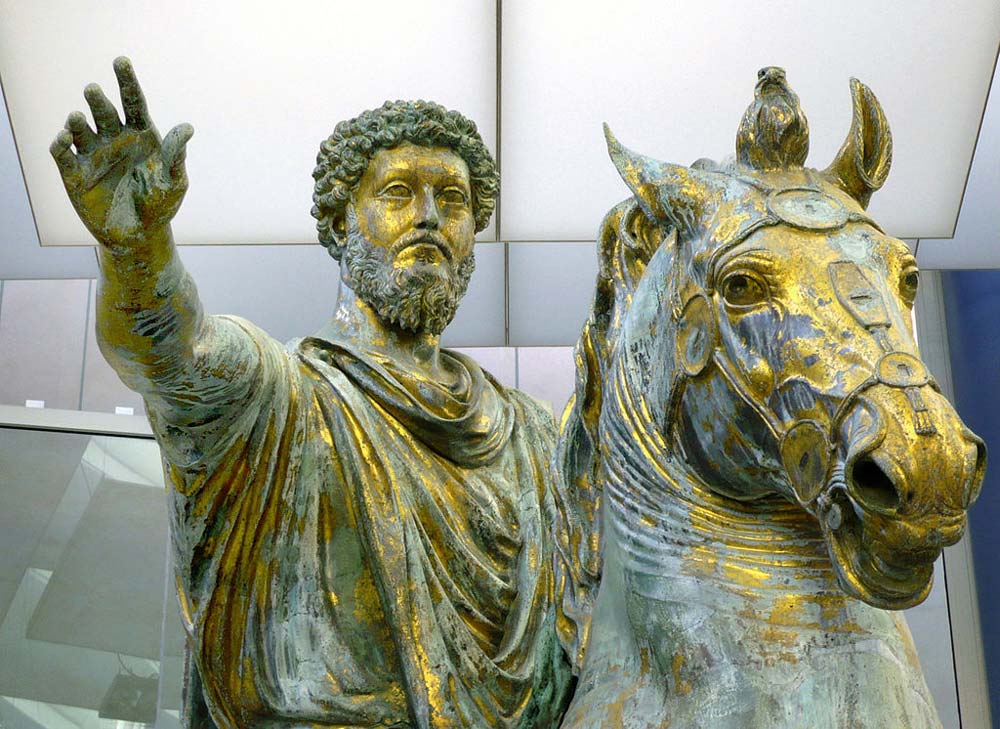| Marcus Aurelius | |
|---|---|
 |
|
| Roman Emperor | |
| In Power | Mar. 8, 161 – Mar. 180 |
| Born | Marcus Annius Catilius Severus April 26, 121 Rome |
| Died | March 17, 180 (at age 58) Vindobona or Sirmium |
| Royal House | Antonine |
Marcus Aurelius (121-180) reigned as Roman Emperor between 161 and his death, 19 years later. For the first eight years, he and Lucius Verus acted as co-emperors, after which Aurelius ruled alone. His reign came at the end of a period of internal stability and military success for the Romans, and his personal achievements led to his being included as the last of the so-called “Five Good Emperors.” Aurelius was also noted for his philosophical writings, including the book Meditations, which was about how to use nature to keep one’s balance during wartime.
Early-Life
Aurelius was born in Rome on April 26, 121. Like most Emperors at this time, he was born into a rich and privileged household, whose members possessed both great monetary wealth and considerable political influence. The young Marcus proved himself to be a hard-working and diligent student, learning both Greek and Latin to a high standard. In fact, his academic achievements were sufficient to bring him to the attention of the Emperor Hadrian, who was impressed by his serious and committed approach to his studies.
Even at this young age, however, Aurelius had become interested in the teachings of Stoic philosophy. This movement gave prominence to self-restraint, reason, and fate. Among the most influential of the works of Stoicism was Discourses. This book, which was the work of the philosopher Epictetus, an ex-slave, caught the attention of Aurelius, and he resolved to take a similar approach to the way he lived his own life.
Meanwhile, Hadrian had been looking for a man to be his successor as Emperor, since his originally preferred candidate was no longer alive. Hadrian decided to adopt the man who would one day become Emperor: Pius Antonius, who was at that time known as Titus Aurelius Antoninus. Both Marcus Aurelius and the deceased candidate’s own son were adopted by Antoninus, at the instigation of Hadrian himself. Aurelius learned from the example that his newly adopted father displayed in his administrative roles.
The Path to Power
 Marcus Aurelius became consul for the first of three times in 140. As time went on, his powers and responsibilities increased considerably, and he eventually became one of Antoninus’ most important advisers and supporters. During this period, while he maintained his studies of philosophy, Aurelius also began to pay attention to legal affairs. Five years after becoming consul, he married the daughter of the Emperor, Faustina. The couple enjoyed a happy domestic life, and among the best known of their numerous children were Commodus and Lucilla.
Marcus Aurelius became consul for the first of three times in 140. As time went on, his powers and responsibilities increased considerably, and he eventually became one of Antoninus’ most important advisers and supporters. During this period, while he maintained his studies of philosophy, Aurelius also began to pay attention to legal affairs. Five years after becoming consul, he married the daughter of the Emperor, Faustina. The couple enjoyed a happy domestic life, and among the best known of their numerous children were Commodus and Lucilla.
In 161, Antoninus died, and his adoptive son was crowned as the new Emperor, taking the name of Marcus Aurelius Antoninus Augustus in his father’s honor. Lucius Verus, whose full name was Lucius Aurelius Verus Augustus, is thought to have enjoyed the title of co-ruler, although some authorities doubt that Verus had much real power when compared to that of his adoptive brother. Furthermore, some historians argue that only Marcus Aurelius was named as the earlier Emperor’s successor.
A Turbulent Period
 Antoninus had enjoyed a reign which had seen the Roman Empire prosper and remain largely at peace. This peace was quickly to be shattered in the new era, with not only war but also disease ravaging many Roman lands. Among the first conflicts was that over eastern lands with the powerful Parthian Empire. Aurelius remained in Rome to oversee the Empire as a whole, so Verus was responsible for much of the battle planning. The Romans won a fine victory, due in part to the skills of generals such as Avidius Cassius.
Antoninus had enjoyed a reign which had seen the Roman Empire prosper and remain largely at peace. This peace was quickly to be shattered in the new era, with not only war but also disease ravaging many Roman lands. Among the first conflicts was that over eastern lands with the powerful Parthian Empire. Aurelius remained in Rome to oversee the Empire as a whole, so Verus was responsible for much of the battle planning. The Romans won a fine victory, due in part to the skills of generals such as Avidius Cassius.
Nevertheless, the triumph had not come without a high cost. Soldiers returning from the east brought back a plague which took quite a toll on the Roman population, and which recurred at regular intervals for many years. Aurelius and his brother could not focus only on domestic affairs, however, for there was another military threat arising – and this one was much closer to the heart of the Empire.
The late 160s saw German tribesmen attacking Roman settlements along the Danube River, an affront that could not be ignored. Aurelius and Verus quickly raised an army and set off to defeat the invaders. In 169, Verus died, after which Aurelius continued alone to face the German tribes.
Internal Dissent
Despite his successes on the battlefield, there were powerful elements within the Roman Empire who were dissatisfied with Marcus Aurelius’ imperial style and wished him gone. Rumors began to spread, probably planted deliberately by insiders, that the Emperor was terminally ill, and one of these reached the ear of Avidius Cassius. The general took the initiative and proclaimed himself Emperor, a move which pushed Aurelius to go east himself in order to put down the rebellion and re-establish control of his troops.
Cassius himself never faced Aurelius for the right to rule the Roman Empire, since the usurper was killed for his attempt of treason by his own army. Instead, the Emperor and his wife made a grand tour of the eastern lands of the Empire, and succeeded in underlining his authority and legitimacy, re-establishing himself as unquestioned ruler. His success in this task was leavened by his deep sorrow at the loss of Faustina, who died before the couple could return to Rome.
In 177, Aurelius named Commodus, his son, as co-Emperor. The German tribes were once again rebelling, and the two men went into battle together. It was the hope of Marcus Aurelius that a signal victory in the fight against what he saw as northern barbarians would not only consolidate the Empire’s hold on western Germany, but also allow it to take great tracts of territory east of the Rhine that had never been in Roman hands.
Death and Aftermath
The wars against the Germans were still raging when Marcus Aurelius died in Vienna on March 17, 180. Despite this, Commodus – now the sole ruler of the Roman world – quickly decided to call a halt to the fighting in the north, and eastern Germany never became part of the Roman Empire. Aurelius himself was cremated and declared a god, after which his ashes were interred in Hadrian’s mausoleum in Rome. In honor of his military achievements, he was granted a temple and a column in the capital city.
Aurelius’ demise brought an end to the period during which the Roman Empire was at its height. Commodus proved to be a much less capable ruler, partly on account of his neurotic nature and enormous ego and partly because he was seen as an outsider by powerfully connected political and military figures. It is usually considered, however, that for Aurelius to have named anyone else as his preferred successor would have resulted in a civil war – as indeed happened many times in the following years.